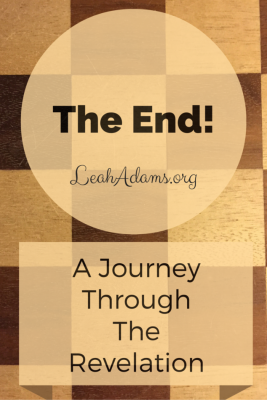Welcome to the beginning of our journey through The Revelation. Just as a reminder…I have a Facebook page for everyone who would like to continue the discussion that begins here. There will EXTRAS on the Facebook page that are not here on the blog, so join us. If you would like to be added to that Facebook page, please email me at [email protected].
We are calling our time together in Revelation ‘The End!’ I’m excited to take this journey with you, so let’s get started. First, though, I want to remind you of my disclaimers:
No one on this earth understands everything about The Revelation
I am not a biblical scholar. I do not have all the answers that will be posed in this journey. I am willing to be taught
The Scriptures will be my primary text for this study, however, I will refer to commentaries and lexicons in my posts
I will offer my opinions on the texts based on my own personal study. I encourage you to do the same
I WILL NOT tolerate snarky, condescending, or ugly comments. They will be deleted. There are many interpretations of The Revelation and we can agree to disagree on certain points
As I sit back and watch the world in which we live grow increasingly wicked, I am drawn more and more to Jesus. He is the only constant. He is the embodiment of love, grace, and mercy, yet He never fails in His righteousness and judgment.
In the final book of Scripture, the apostle John, a man now in his 90s, is given a ‘revelation’ from God through Jesus Christ about the days to come. Some people believe that another John wrote The Revelation, but the strongest evidence seems to point toward John, the author of the gospel of John, 1st, 2nd, and 3rd John.
Evidence for John the Apostle includes testimony by Irenaeus, who was a disciple of Polycarp (death AD 155). Polycarp was a disciple of John the apostle. Also Justin Martyr (AD 135) and Clement of Alexandria, as well as Tertullian in the 3rd century name the author of The Revelation as John the Apostle.
Commentator John MacArthur in the MacArthur New Testament Commentary – Revelation says (p.7) that only the gospel of John and The Revelation refer to Christ as the Word (John 1:1; Revelation 19:13). The Revelation frequently describes Christ as the Lamb—a title elsewhere given to Him only in John’s gospel. Both the gospel of John and Revelation refer to Jesus as a witness (John 5: 31-32; Rev. 1:5).
The following chart from Warren Wiersbe helps clarify the writings of John the Apostle and how each of his Biblical offerings are interconnected with the other.
Gospel of John Epistles Revelation
Believe, 20:31 Be sure, 1 John 5:13 Be ready, 22:20
Life received Life revealed Life rewarded
Salvation Sanctification Sovereignty
The Prophet The Priest The King
Let’s start with a bit of background. For those of you who love history, you are gonna flat eat this up. I’m one of those. For those who get history heartburn, dash to the medicine cabinet for an Alka-Seltzer and hang with me. The background and history is crucial to the understanding of Jesus’ revelation. I promise it will be worth it.
The Greek word used for revelation is apokalupsis. What English word do you see in there? If you said apocalypse, you are right. When you and I think of the word apocalypse, we think of far-reaching destruction and death, so the meaning of this Greek word will surprise you, I think.
The New American Commentary (p. 51) offers this definition: ‘refers to something formerly hidden but now unveiled.’ Another commentary suggested that apokalupsis may be used when a direct word is revealed by God. This is confirmed by the very first verse of the book.
This is a revelation from Jesus Christ, which God gave him concerning the events that will happen soon. An angel was sent to God’s servant John so that John could share the revelation with God’s other servants. Revelation 1:1 (NLT)
DATING OF THE REVELATION
There are two schools of thought regarding the dating. Early dating advocates say somewhere around AD 68-70, while those who ascribe to the later dating believe it was AD 95-ish.
There are stronger arguments for the AD 95 date, but one of the strongest surrounds the condition of some of the seven churches. They were spiritually vibrant in Paul’s day, which would have been the mid 60s. Such a decline to the condition that Jesus described to John would have likely taken longer than 3-5 years.
I tend to lean toward the later dating.
Enough for today! Let’s engage. Here are some questions for your pondering and discussing pleasure.
- Were you surprised at the meaning of the word ‘revelation’?
- Do you have a bent toward the earlier dating of the book or the later dating?
- Have you ever studied The Revelation? If you did, share with us the study material that you used. This is a great opportunity to share some references for further study.
- Was there anything in today’s lesson that will strengthen your faith for The End and for today? If so, please share it in the comments.




